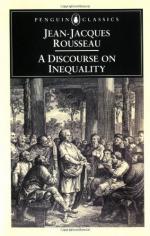
|
| Name: _________________________ | Period: ___________________ |
This quiz consists of 5 multiple choice and 5 short answer questions through Chapter 6, A Discourse on the Origin of Inequality, Appendix.
Multiple Choice Questions
1. The arts and sciences have helped human beings to repress what according to "Chapter 1, A Discourse on the Moral Effects of the Arts and Sciences, Part I"?
(a) Their wickedness.
(b) Their kindness.
(c) Their infatuation.
(d) Their narcissism.
2. Human morals are not improved by what subject according to Rousseau?
(a) The sciences.
(b) The arts.
(c) Engineering.
(d) Religion.
3. How is wasting time viewed by society today, according to "Chapter 2, A Discourse on the Moral Effects of the Arts and Sciences, Part II"?
(a) Evil.
(b) Lazy.
(c) Needed.
(d) Good.
4. What was man's second feeling, according to Rousseau?
(a) His breath.
(b) Crying.
(c) Self preservation.
(d) His existence.
5. Which of the following are NOT the natural enemies of mankind, mentioned in "Chapter 4, A Discourse on the Origin of Inequality, Part One"?
(a) Old age.
(b) Disease.
(c) Money.
(d) Animals.
Short Answer Questions
1. What did the poor become, according to Rousseau?
2. How many types of inequality does Rousseau see among humans in "Chapter 4, A Discourse on the Origin of Inequality, Part One"?
3. What does Rousseau want all individuals to have love for?
4. Who did Rousseau praise for his ignorance in "Chapter 1, A Discourse on the Moral Effects of the Arts and Sciences, Part 1"?
5. What does Rousseau understand about the idleness in children?
|
This section contains 219 words (approx. 1 page at 300 words per page) |

|




